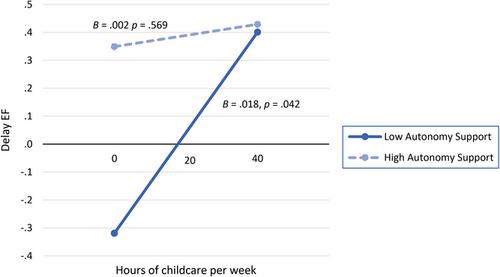On executive functioning and childcare: The moderating role of parent–child interactions
Abstract
Childcare services are widely used by families and thereby exert an important influence on many young children. Yet, little research has examined whether childcare may impact the development of child executive functioning (EF), one of the pillars of cognitive development in early childhood. Furthermore, despite persisting hypotheses that childcare may be particularly beneficial for children who have less access to optimal developmental resources at home, research has yet to address the possibility that putative associations between childcare and EF may vary as a function of family factors. Among a sample of 180 mostly White middle-class families (91 girls), we examined if childcare participation in infancy was related to two aspects of EF (Delay and Conflict) at 3 years, and whether two aspects of maternal parenting behavior (sensitivity and autonomy support) moderated these associations. The results showed positive associations between participation in group-based childcare and Delay EF specifically among children of relatively less autonomy-supportive mothers. These findings suggest that out-of-home childcare services may play a protective role for children exposed to parenting that is less conducive to their executive development.
Research Highlights
- Little research has considered effects of childcare in infancy on executive functioning (EF).
- Long-standing hypothesis that childcare is more beneficial for children exposed to less sensitive and supportive parenting.
- We test interactions between maternal parenting and childcare participation in infancy in relation to EF at age 3 years.
- We find positive associations between participation in group-based childcare and Delay EF specifically among children of relatively less autonomy-supportive mothers.


 求助内容:
求助内容: 应助结果提醒方式:
应助结果提醒方式:


